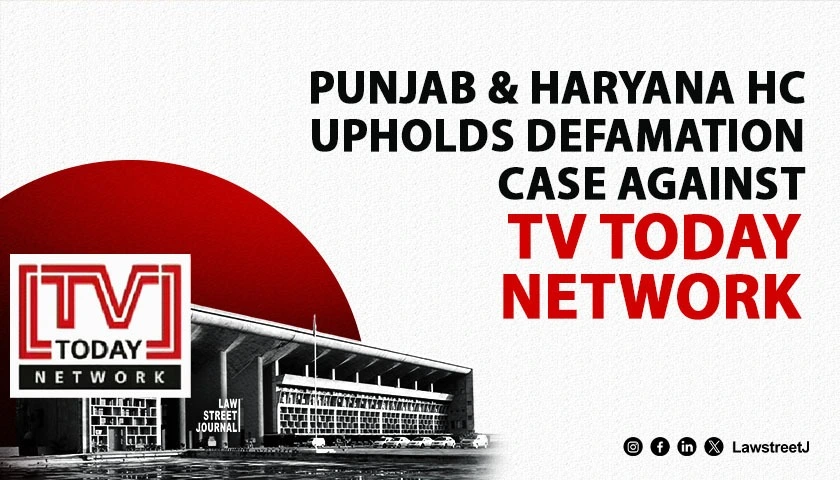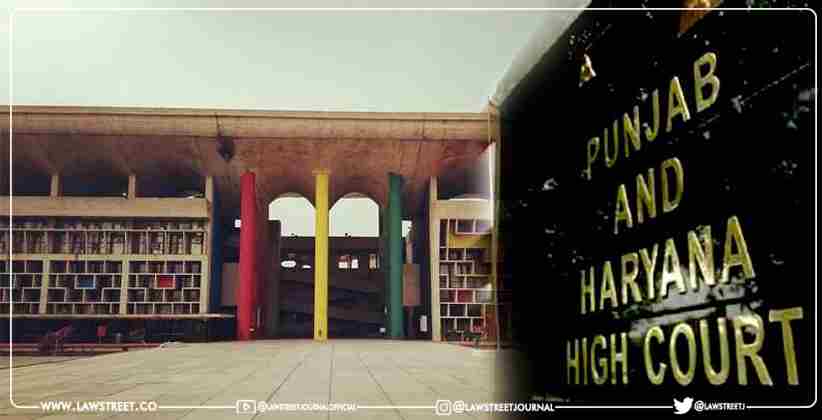Punjab: The Punjab and Haryana High Court has dismissed a petition filed by TV Today Network Limited challenging defamation proceedings, upholding the magistrate’s authority to direct police investigations into non-cognizable offences.
Justice Tribhuvan Dahiya delivered the judgment on August 6, 2025, rejecting the media house’s argument that defamation cases cannot be investigated by police without compliance with specific procedural safeguards under criminal law.
The court was hearing CRM-M-3523-2025, filed by TV Today Network Limited against the State of Haryana and complainant Gopal Goyal Kumar. The petition challenged multiple orders, including a magistrate’s direction dated December 21, 2022, and a subsequent police investigation culminating in a chargesheet filed on May 29, 2024.
Background of the Case:
The matter arose from a complaint filed by Gopal Goyal Kumar on December 6, 2022, alleging criminal conspiracy to defame him and damage his political and business reputation. Prior to the complaint, Kumar, through his advocate Mr. Vikas Verma, had issued a cease-and-desist notice to major online platforms—including Google India, YouTube, Facebook India, and Twitter India—seeking removal of allegedly defamatory content.
Initially, based on the District Attorney’s opinion dated December 15, 2022, police concluded that no cognizable offence was made out. Kumar then approached the Judicial Magistrate First Class under Section 155(2) read with sub-sections (3) and (4) CrPC, seeking a direction for investigation.
On December 21, 2022, the magistrate directed the Station House Officer to register a non-cognizable case and conduct an investigation, observing: “It is abundantly clear that a non-cognizable offence is made out, and police cannot shirk their responsibility to lodge a non-cognizable report.”
Following this order, Non-Cognizable Report (NCR) No. 65/2022 was registered on December 31, 2022, under Section 500 IPC at Police Station Badshahpur, Gurugram. Upon completion of the investigation, police filed a chargesheet on May 29, 2024, after which the magistrate issued notice to the accused on June 6, 2024.
Arguments and Court’s Findings:
Counsel for TV Today Network, Mr. Hrishikesh Baruah (with Ms. Jasneet Kaur), argued that in defamation cases, provisions of Section 156(3) CrPC cannot be invoked due to the bar under Section 199 CrPC, which governs prosecution of offences against the human body. The petitioner relied on Kanhaiya Lal v. State of U.P. (Allahabad High Court) and Harjit Singh Hassanpuri v. State of Punjab (Punjab & Haryana High Court), contending that defamation complaints must be pursued through private complaints, not police investigation.
The Court, however, distinguished the precedents, noting that unlike in Kanhaiya Lal, no direction under Section 156(3) CrPC for FIR registration was issued here. Instead, the investigation proceeded under Section 155(2) CrPC, pursuant to the magistrate’s order in a non-cognizable case. Justice Dahiya clarified: “Investigation has been carried out on the basis of a complaint disclosing a non-cognizable offence, and the chargesheet has been filed pursuant to directions under Section 155(2) CrPC.”
The Court reiterated that Section 155 CrPC explicitly provides that police cannot investigate non-cognizable cases without a magistrate’s order, and once such an order is issued, the investigation is lawful. Accordingly, the Court found the procedure proper and refused to interfere.
Representation:
Ms. Tanushree Gupta, Senior Deputy Advocate General, appeared for the State of Haryana. The second respondent, Gopal Goyal Kumar, remained unrepresented.
Justice Dahiya ultimately held that both Kanhaiya Lal and Harjit Singh Hassanpuri were inapplicable, as they were premised on directions under Section 156(3) CrPC, while the present case dealt strictly with Section 155(2).
Case Title: TV Today Network Limited v. State of Haryana & Another




![Police protection to fund manager alleging threat from Kirron Kher & aide: Punjab & Haryana HC [Read Order]](/secure/uploads/2023/12/lj_9007_Police_Kirron_Kher.jpg)
![Most interested witness being the father of deceased, SC upholds acquittal of 6 accused for murder [Read Judgment]](/secure/uploads/2023/12/lj_9904_df2c02a2-d8c5-4dd6-8b58-a59e17b8635b.jpg)
![Supreme Court Collegium approves new Chief Justices for five key High Courts in India [Read Recommendations]](/secure/uploads/2023/12/lj_8000_380d1135-6f3a-4988-a00a-4d5cd5901815.jpg)






